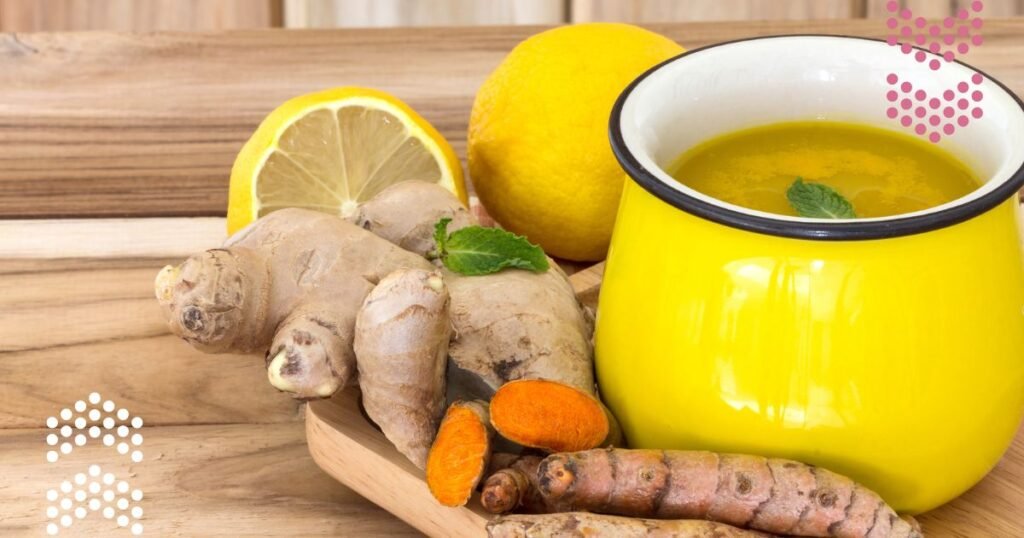Anti-Inflammatory Foods to Reduce PCOS-Related Inflammation in Women
Polycystic Ovary Syndrome (PCOS) affects millions of women worldwide, leading to hormonal imbalances, insulin resistance, and chronic inflammation. This condition makes it difficult for women to manage their weight, maintain energy levels, and improve overall health. While there is no cure for PCOS, adopting an anti-inflammatory diet can help significantly reduce inflammation, alleviate symptoms, and support weight management.
Chronic inflammation is one of the key issues for women with PCOS, making it harder to control other symptoms like insulin resistance, fatigue, and irregular menstrual cycles. Thankfully, incorporating anti-inflammatory foods into your diet can help combat these issues and improve your quality of life. In this article, we will explore the top anti-inflammatory foods and how they benefit women dealing with PCOS-related inflammation.
Understanding PCOS and Inflammation
PCOS often causes chronic inflammation due to hormonal imbalances and insulin resistance. This inflammation contributes to worsening symptoms such as fatigue, weight gain, and higher risks of metabolic diseases. Elevated insulin levels and increased androgens (male hormones) are common in women with PCOS, further exacerbating the inflammation and leading to weight gain, acne, and hair loss.
Studies show that women with PCOS have higher levels of inflammatory markers, such as C-reactive protein (CRP), which can worsen over time if not properly managed. Managing PCOS through dietary choices, especially by incorporating anti-inflammatory foods, is key to reducing these harmful effects and improving overall health.
Reducing inflammation is crucial for managing insulin resistance and metabolic issues that come with PCOS. Focusing on anti-inflammatory foods can help balance your hormones, reduce insulin resistance, and help women lose weight more effectively. You can learn more about PCOS-related inflammation and its effects on women’s health on our dedicated blog.
The Science Behind Anti-Inflammatory Foods
Anti-inflammatory foods are essential for reducing the body’s inflammatory response, which is often elevated in women with PCOS. These foods contain compounds like antioxidants, polyphenols, and healthy fats, which combat oxidative stress and reduce inflammation markers such as CRP. By lowering inflammation, these foods can help improve insulin sensitivity and regulate hormones.
Many anti-inflammatory foods work by preventing the activation of inflammatory pathways. Foods rich in antioxidants, like fruits and vegetables, help neutralize free radicals, which can damage cells and trigger inflammation. Omega-3 fatty acids found in fatty fish, such as salmon and mackerel, also reduce inflammation by blocking pro-inflammatory molecules in the body.
Incorporating these anti-inflammatory foods regularly into your diet not only helps lower inflammation but also promotes better energy levels, mood stability, and improved metabolism, which is critical for women dealing with PCOS.
Top 10 Anti-Inflammatory Foods for Women with PCOS
Incorporating these anti-inflammatory foods into your daily diet can help you manage PCOS symptoms and reduce inflammation over time. Here’s a list of the top 10 foods that can help.
1. Fatty Fish (Salmon, Mackerel, Sardines)
Fatty fish like salmon, mackerel, and sardines are excellent sources of omega-3 fatty acids. Omega-3s are known for their potent anti-inflammatory properties, helping reduce inflammation and improve insulin sensitivity in women with PCOS. These healthy fats can also support heart health, which is essential since women with PCOS are at higher risk of cardiovascular diseases.
Fatty fish should be included in your diet at least twice a week. Consider grilling or baking the fish instead of frying to keep it as healthy as possible.
2. Berries (Blueberries, Strawberries, Raspberries)
Berries are packed with antioxidants, which help reduce oxidative stress and inflammation in the body. They are also rich in fiber, which helps improve gut health and manage blood sugar levels, both of which are important for women with PCOS.
Eating a variety of berries daily can significantly lower inflammatory markers and improve your overall health. Berries are an excellent snack option or can be added to smoothies, yogurt, or salads for an extra boost of nutrients.
3. Leafy Greens (Spinach, Kale, Swiss Chard)
Leafy greens are full of vitamins A, C, and K, which have strong anti-inflammatory properties. These vegetables are low in calories and high in antioxidants, making them an ideal food for women with PCOS trying to manage their weight and inflammation levels.
Adding leafy greens like spinach, kale, and Swiss chard to your daily meals can help lower inflammation and support hormone balance.
4. Nuts (Walnuts, Almonds, Brazil Nuts)
Nuts are a great source of healthy fats, fiber, and antioxidants. They help reduce inflammation and improve heart health. Walnuts and almonds are especially beneficial due to their high levels of omega-3 fatty acids and antioxidants. Brazil nuts are also rich in selenium, an essential mineral that supports thyroid function and helps reduce inflammation.
A handful of nuts each day can provide anti-inflammatory benefits. However, make sure to eat them in moderation since they are calorie-dense.
5. Extra Virgin Olive Oil
Extra virgin olive oil is known for its powerful anti-inflammatory effects. It contains oleocanthal, a compound that has been shown to reduce inflammation similarly to ibuprofen. Additionally, olive oil is rich in antioxidants that protect the body against oxidative stress and improve cardiovascular health.
Use extra virgin olive oil as your primary cooking oil and for salad dressings to take advantage of its health benefits.
6. Turmeric
Turmeric is a bright yellow spice that contains curcumin, one of the most potent anti-inflammatory compounds. Studies have shown that curcumin can significantly reduce inflammatory markers and improve insulin sensitivity, making it highly beneficial for women with PCOS.
Incorporating turmeric into your diet can be as simple as adding it to soups, stews, or even teas. To enhance the absorption of curcumin, pair it with black pepper.
7. Green Tea
Green tea is rich in antioxidants, particularly EGCG, which helps reduce inflammation and combat insulin resistance. Drinking green tea regularly can improve metabolism and aid in weight management, both of which are crucial for women with PCOS.
A cup of green tea each day can provide these anti-inflammatory benefits while also offering a caffeine-free energy boost.
8. Avocados
Avocados are high in healthy fats and fiber, both of which are known to reduce inflammation. The healthy fats in avocados help improve insulin sensitivity and promote hormone balance, which is critical for managing PCOS symptoms.
Avocados can be added to salads, smoothies, or eaten on their own. They are also a great alternative to less healthy fats like butter or margarine.
9. Chia Seeds
Chia seeds are rich in omega-3 fatty acids and fiber, which help regulate blood sugar levels and reduce inflammation. These tiny seeds are a great addition to smoothies, oatmeal, or yogurt and can be used as an egg substitute in baking.
Incorporating chia seeds into your diet is an easy way to add more omega-3s and fiber, which are crucial for managing PCOS-related inflammation.
10. Ginger
Ginger has long been known for its powerful anti-inflammatory and antioxidant properties. It helps reduce pain and inflammation, making it especially beneficial for women with PCOS who experience joint pain or other inflammatory symptoms.
Ginger can be added to teas, smoothies, and meals for an extra anti-inflammatory boost.
How to Incorporate Anti-Inflammatory Foods into Your Daily Diet
Incorporating anti-inflammatory foods into your daily diet can be simple and rewarding. Start by focusing on adding more fruits, vegetables, and healthy fats to your meals. Fatty fish, such as salmon, mackerel, and sardines, should be included at least twice a week to reap the benefits of omega-3 fatty acids.
For breakfast, consider a smoothie made with berries, spinach, and chia seeds for an anti-inflammatory punch. You can also add turmeric or ginger to your morning tea or coffee for added benefits. At lunch and dinner, use extra virgin olive oil to dress your salads or as a cooking oil for your vegetables and lean proteins.
Make sure to avoid processed foods, sugary drinks, and refined carbohydrates, as they can trigger inflammation and worsen PCOS symptoms. By consistently including anti-inflammatory foods, you can reduce inflammation and manage your symptoms effectively.
Foods to Avoid that Trigger Inflammation in Women with PCOS
While including anti-inflammatory foods is important, it’s equally crucial to avoid foods that trigger inflammation. Refined carbohydrates, processed foods, and sugary beverages can spike insulin levels, leading to increased inflammation and worsening PCOS symptoms.
Refined Carbohydrates
Refined carbohydrates, such as white bread, pasta, and sugary snacks, are quickly digested and cause rapid spikes in blood sugar and insulin levels. This triggers inflammation and can worsen insulin resistance in women with PCOS.
Processed Foods
Processed foods, including packaged snacks, fast food, and processed meats, often contain trans fats and high amounts of sugar and salt, which contribute to inflammation. These foods can also increase the risk of heart disease and obesity, which are more common in women with PCOS.
Red and Processed Meats
Red meats and processed meats, like bacon, sausage, and cured meats, are high in saturated fats, which can increase inflammation. It’s best to limit or avoid these foods to prevent further inflammation and cardiovascular risks.
Sugary Beverages
Sugary drinks, such as sodas, sweetened coffee drinks, and juices, can spike blood sugar levels and increase insulin resistance. Women with PCOS should avoid these beverages and opt for water, green tea, or herbal teas instead.
The Role of Hydration and Anti-Inflammatory Drinks
Proper hydration is essential for reducing inflammation and supporting overall health. Drinking enough water helps flush out toxins and improve digestion, which is particularly important for women with PCOS.
In addition to water, drinking anti-inflammatory beverages such as green tea or herbal teas with ginger and turmeric can help reduce inflammation. Avoid sugary drinks, as they can increase inflammation and worsen PCOS symptoms.
Additional Lifestyle Changes to Reduce PCOS-Related Inflammation
Exercise
Regular exercise plays a significant role in reducing inflammation. Simple activities such as walking, yoga, or swimming can help lower inflammation and improve insulin sensitivity in women with PCOS. Aim for at least 30 minutes of moderate exercise most days of the week to see the best results.
Stress Management
Chronic stress raises cortisol levels, which can increase inflammation and worsen PCOS symptoms. Incorporating stress management techniques like meditation, deep breathing exercises, and yoga can help lower cortisol levels and reduce inflammation. Finding time to relax and unwind is essential for managing stress-related inflammation.
Sleep
Sleep is essential for regulating hormones and reducing inflammation. Poor sleep can lead to elevated cortisol levels, which can increase insulin resistance and inflammation. Aim for 7-9 hours of quality sleep each night to support overall health and reduce PCOS-related inflammation.
Supplements That Support Inflammation Reduction in PCOS
Omega-3 Supplements
For women who don’t eat enough fatty fish, omega-3 supplements are a great option. Omega-3 supplements can provide the same anti-inflammatory benefits as eating fatty fish and can help support heart health and hormone balance in women with PCOS.
Curcumin
Curcumin, the active compound in turmeric, is a powerful anti-inflammatory agent. Taking curcumin supplements can help reduce inflammatory markers and improve insulin sensitivity. Pairing curcumin with black pepper can enhance its absorption and effectiveness.
Magnesium
Magnesium is an essential mineral for regulating hormones and reducing inflammation. Many women with PCOS have lower magnesium levels, which can contribute to inflammation and worsen symptoms. Adding magnesium supplements to your routine can support hormone balance and reduce inflammation.
Vitamin D
Vitamin D deficiency is common in women with PCOS and has been linked to increased inflammation and insulin resistance. Taking a vitamin D supplement can help reduce inflammation and improve insulin sensitivity, which is critical for managing PCOS.
Probiotics
Probiotics support gut health and can help reduce inflammation. A healthy gut microbiome plays a key role in regulating immune function and reducing inflammation, which is essential for women with PCOS. Consider adding a high-quality probiotic supplement to your routine to support gut health and reduce inflammation.
Conclusion
Managing PCOS-related inflammation through diet and lifestyle changes is essential for improving overall health and reducing symptoms. Incorporating anti-inflammatory foods like fatty fish, berries, leafy greens, and turmeric can make a significant difference in managing inflammation and promoting weight management. By making gradual but consistent dietary changes, women with PCOS can see long-term improvements in their health and well-being.
For more helpful information on how diet and weight loss play a role in managing health, explore further resources online. You can also browse our website for more information about how to manage PCOS through nutrition and lifestyle changes.
FAQs
Q: Can an anti-inflammatory diet alone cure PCOS?
A: No, but it can significantly reduce symptoms and improve quality of life. An anti-inflammatory diet, when paired with other lifestyle changes, can help women with PCOS manage their symptoms more effectively.
Q: How long does it take to see results from an anti-inflammatory diet?
A: Results vary, but many women notice improvements in their energy levels, inflammation markers, and overall well-being within a few weeks of making dietary changes. Consistency is key to seeing long-term improvements.
Q: Can I still eat carbs on an anti-inflammatory diet?
A: Yes, but it’s important to focus on complex carbohydrates like whole grains, fruits, and vegetables. Refined carbs should be avoided, as they can spike insulin levels and contribute to inflammation.
Q: Are there any foods I should eat sparingly, even if they’re anti-inflammatory?
A: While anti-inflammatory foods are healthy, it’s still important to practice portion control. Overeating any food, even healthy ones, can lead to weight gain, which can worsen PCOS symptoms.
For additional resources, browse our healthy weight section to learn more about managing weight with PCOS.


